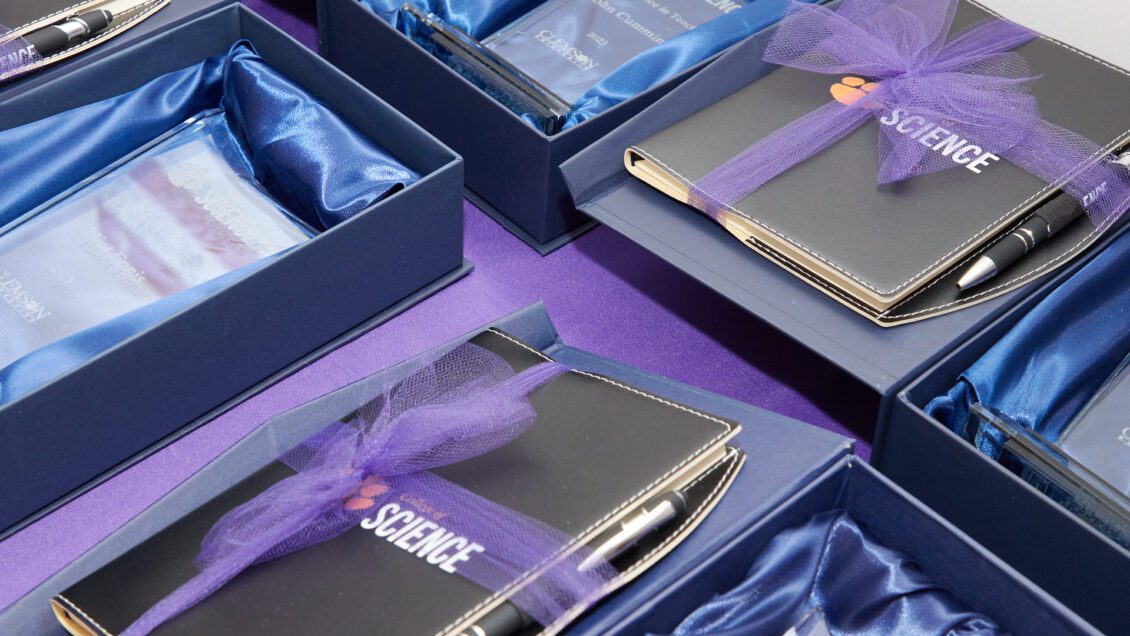Several Clemson University College of Science faculty and staff members were honored for excellence during an awards ceremony on May 11.
The awards recognized teaching and research excellence, outstanding performance, and outstanding student service and engagement.
The honorees were:
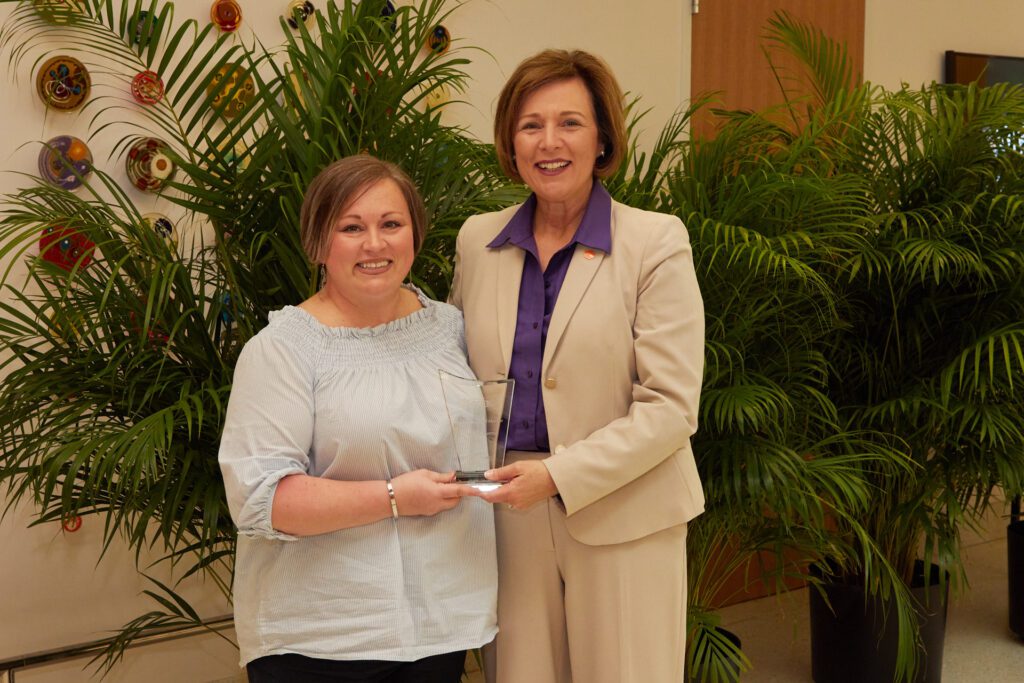
Outstanding Staff Member: Andrea Thornal
Andrea Thornal, a financial analyst in the College of Science’s Dean’s Office, is known for her excellent customer service and positive, can-do attitude.
Thornal works with the Department of Biological Sciences, supporting the teaching, research and outreach missions of the department. With more than 50 faculty, about 10 postdoctoral fellows, 30 staff members and 75 graduate students, the Department of Biological Sciences has a complex budget with department accounts and many incentive, start-up and teaching lab accounts.
Thornal has created systems, processes and policies to help the department track, plan, budget and grow its funds. She manages and monitors start-up funding, including meeting with future faculty to help them get their labs set up. She identifies issues and proposes solutions. Thornal, who has been promoted to finance support services manager for the College of Science, helps Biological Sciences trim costs and increase revenue.
“I often forget that Andrea isn’t actually in Biological Sciences because she is so invested in our department’s successes and celebrates our wins,” said Ginger Foulk, project coordinator for the Department of Biological Sciences, in her nomination letter.
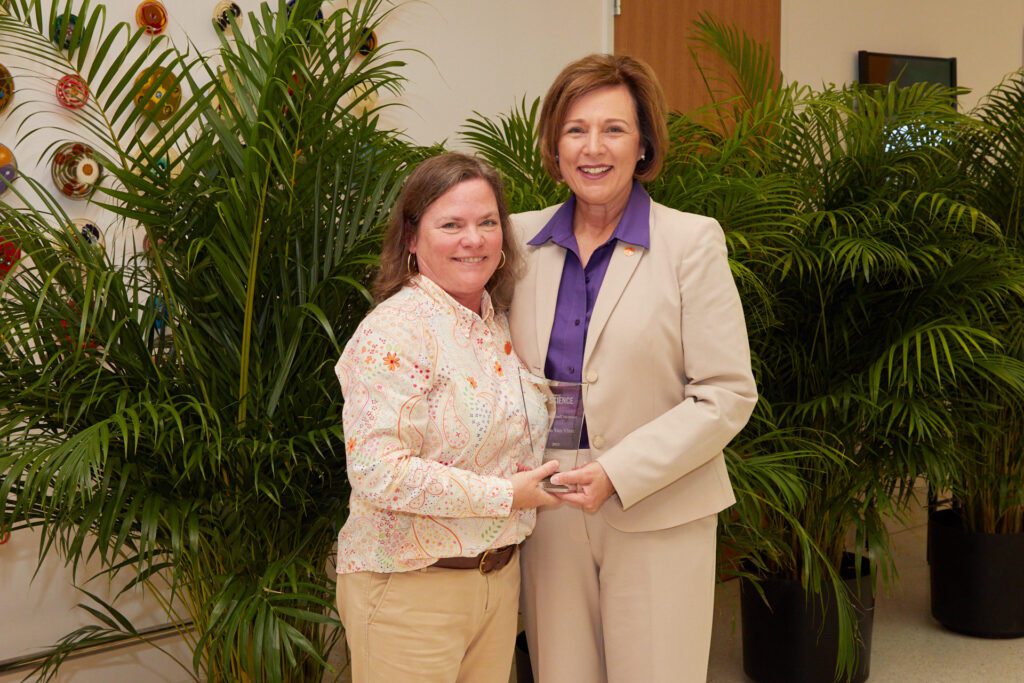
Outstanding Staff Member: Jo Ellen Van Vliet
Administrative Assistant Jo Ellen Van Vliet is the first point of contact in the Science Dean’s Office, and she juggles many job duties at one time.
Van Vliet managed the College’s Catalyst Competition, which included overseeing committee meetings as well as managing communication with faculty mentors, industry advisers, students and internal support teams. She facilitated four virtual workshops to educate students in various aspects of entrepreneurship that were facilitated by industry advisers. She was the face to students helping address their questions and sending them reminders as the competition day approached. Students greatly appreciated Van Vliet’s help, counseling and guidance through the two semester-long program.
But Van Vliet’s contributions to the College of Science extend well beyond her work with Catalyst. She provides support for two members of the Dean’s leadership team and the student services team. She coordinates and supports multiple College events. She supports activities related to the College’s diversity and inclusion plan.
“Her excellent work has a long reach among College staff and in all units in the College,” wrote Chief Strategy and Engagement Officer Liliana Gehring and Associate Dean Steve Creager in their nomination letter.
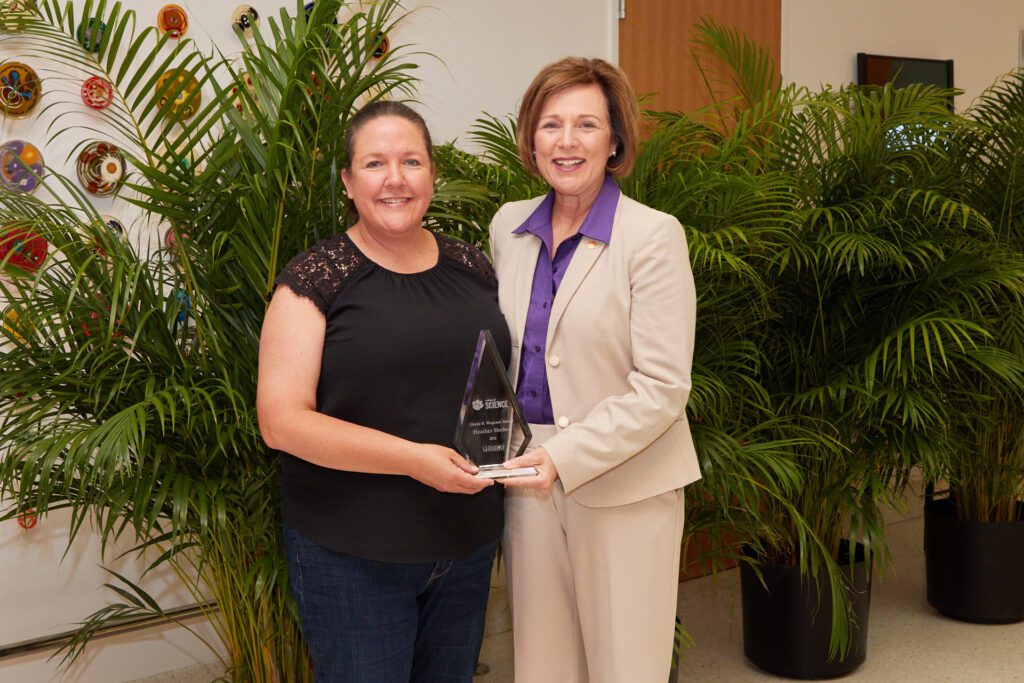
Hattie B. Wagener Award: Heather Shelton
Heather Shelton, graduate student coordinator for the Department of Chemistry, is the recipient of the 2023 Hattie B. Wagener Award. The endowed award is named after Hattie Boone Wagener, a long-time administrative staff member at Clemson. It recognizes an individual who readily and routinely exceeds stated job expectations and presents a positive work attitude.
Shelton was instrumental in the chemistry department’s implementation of a system to capture students interested in the department’s program, automatically contact them by email and follow the application process all the way to admission. To do this, she learned and used HTML coding.
She fields phone calls and emails from prospective students. The Department has the largest Ph.D. program at Clemson with more than 420 applicants this year. As a result of her efforts, the Department doubled the number of domestic students in the incoming graduate class and improved the quality of the applicant pool GPA by almost a half point. This year, the department will enroll the largest-ever class in its Ph.D. program.
Shelton organizes annual graduate student recruitment weekends, organizes recruiting booths at American Chemical Society meetings and helped implement a sign-up bonus which is given to every incoming graduate student to help offset moving costs. She was also instrumental in deploying the department’s recently approved non-thesis M.S. degree program.
“Heather is a true jewel in our organization, and without Heather, our graduate program would be without its staunchest supporter and innovator,” wrote Department of Chemistry Chair William Pennington and Professor and Associate Department Chair Carlos Garcia.
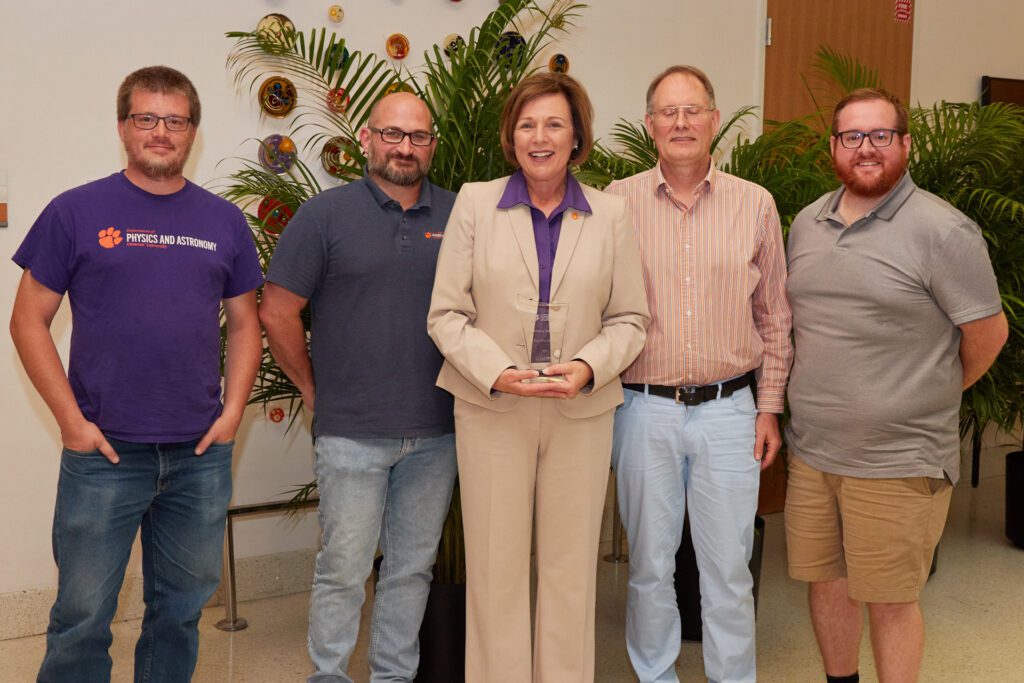
Outstanding Team: VortEx team
The Clemson University VortEx team that includes faculty, staff and students from the Department of Physics and Astronomy is this year’s winner of the Outstanding Team Award. Team members Gerald Lehmacher, Miguel Larsen, Patti Larsen, Lamar Durham, Deborah Durham, Danielle Markowski, Andrew Pepper, Michael Denz and Barrett Barker are being recognized for their successful rocket campaign in Andoya, Norway, on March 23, 2023.
The VortEx team submitted a proposal to NASA to build hardware to be mounted on sounding rockets for studying upper altitude winds and waves in the upper atmosphere. As humanity grows ever more reliant on satellite technology, understanding the interplay between solar events, upper altitude winds and waves, and Earth’s magnetic field is essential.
The proposal was approved in 2019 for an anticipated launch in 2021. Because of COVID, the launch was postponed until 2023.
After years of preparation, the team remained at the mercy of supply chains and the weather. Shipment delays to Norway shrunk their launch window from 18 days to nine days, and inclement weather made the first seven days of that window unusable. They were able to launch their rockets and perform their experiments in those two remaining days.
Their work received significant international coverage.
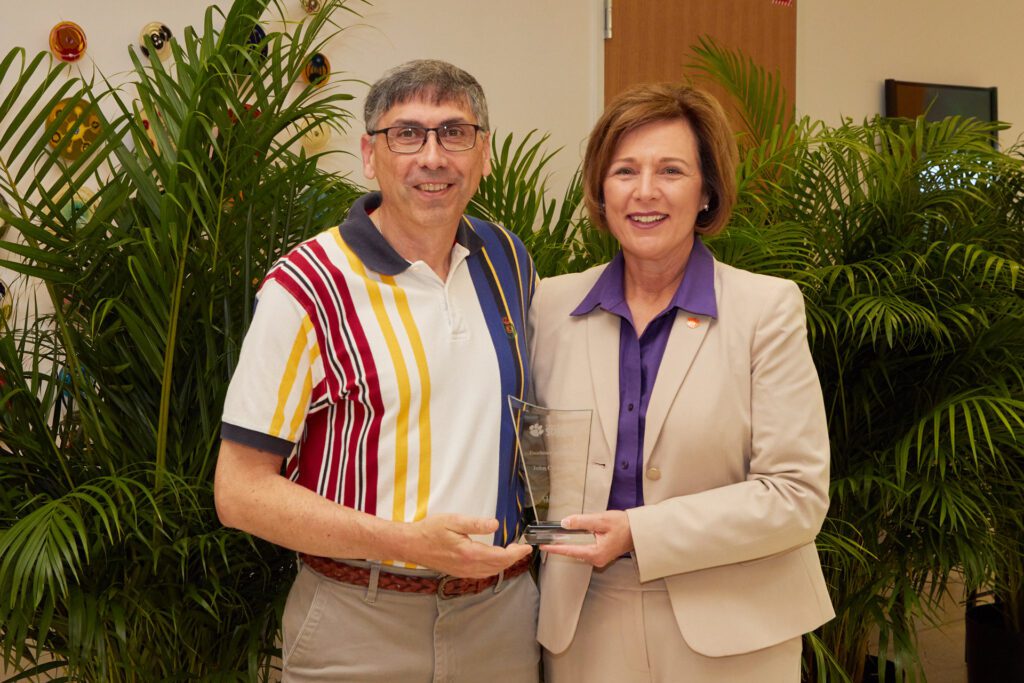
Excellence in Teaching Award: John Cummings
Department of Biological Sciences Principal Lecturer John Cummings stands out among instructional faculty for his dedication to teaching the next generation of health professionals and biologists, developing graduate student teachers and devising ways to support learning — not just in his class, but throughout the University.
Cummings had never taught online and thought that human anatomy and physiology lab should not be taught online. But when COVID hit in March 2020, he stepped up to figure out how to best do an A&P lab so that students in nursing and other majors would have the best experience possible. His students perform well on the National Council Licensure Examination for Registered Nurses, indicating their level of preparation for this national exam. To help students learn the material, he has developed outside learning resources, implemented a Peer Assisted Learning (PAL) component to the course, maintains open lab times and is always available to his students.
He teaches the largest number of student credit hours of any faculty in the Department of Biological Sciences — about 4,500, with the average for a senior lecturer being 2,300.
When he recognized that recreational therapy students were having trouble being successful in the courses designed for nursing and health sciences majors because they were missing fundamental background and motivation for the courses, he advocated for creation of a course specifically to meet their needs. When exercise physiology was no longer meeting the needs of Biological Sciences students, he stepped in to fill the need.
Cummings has received three teaching and educator awards in the past four years — the Delta Alpha Pi Honor Society Extraordinary Educator Award in 2019, the Phil Prince Innovation in Teaching Award in 2020 and the Dr. Ted G. Westmoreland Award for Faculty Excellence from the Class of 1956 Academic Success Center in 2023.
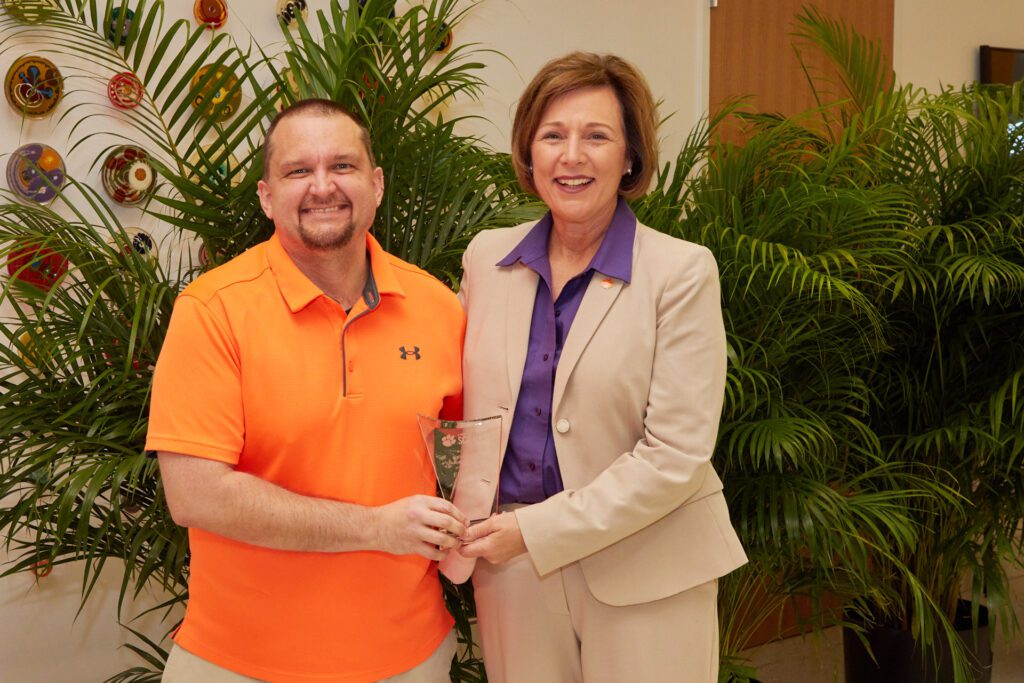
Excellence in Student Engagement Award: Elliot Ennis
Department of Chemistry Senior Lecturer Elliot Ennis teaches in the general chemistry and organic chemistry programs. His students routinely comment on his highly effective teaching methods. But it’s what he does beyond his expected duties that sets him apart as an educator and mentor of students.
He never hesitates to volunteer for new assignments that will benefit his students. This ranges from evaluation of virtual laboratory experiments, volunteering as an academic adviser, developing a program to train undergraduate students to assisting graduate teaching assistants in general education labs and developing a new general education course that meets the global engagement requirements of the University.
The virtual lab project took place a year or two before COVID. While the conclusion was that virtual labs weren’t as effective as “real” labs, the study proved valuable in allowing the chemistry department to offer effective virtual labs during the pandemic.
He has developed a new course, Scientific Skepticism, which covers the role of science in society with an emphasis on recognizing bad science or pseudoscience. He is the first chemistry lecturer to develop a new course from scratch.
“Few people that I’ve interacted with in my career at Clemson University are more committed to engaging with undergraduate students across a wide range of modalities — teaching, course development, Creative Inquiry and academic advising — at the incredible level that Elliot brings to the table,” wrote Modi Wetzler, a senior lecturer in the Department of Chemistry, in a nomination letter.
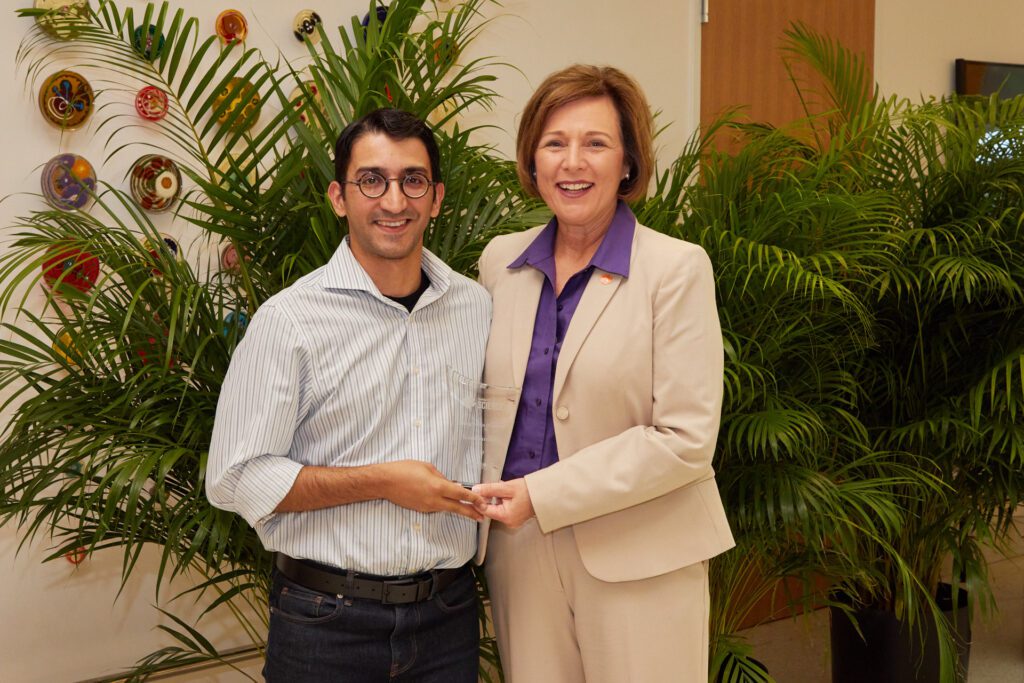
Rising Star in Discovery Award: Kasra Sardashti
A member of the Clemson faculty since 2020, Department of Physics and Astronomy Assistant Professor Kasra Sardashti has distinguished himself in many ways.
First, he has set up the first real low temperature physics facility the department has hosted in more than two decades, re-establishing the viability of the condensed matter physics program to prospective students, faculty and external funding agencies.
Within his newly formed research team, Sardashti has the most diverse group of students at the graduate and undergraduate level in the department. His most recent award, a one-of-its-kind Department of Energy effort with a historically Black university in North Carolina, supports training in quantum engineering that will bring students to Clemson and aims to increase diversity in the physics and astronomy department’s graduate population.
Sardashti has published research in Nature, the Physical Review journals and Applied Physics Letters, some of the most highly regarded and cited journals in his field. During his short tenure at Clemson, he has expanded his research off-campus, including at the Oak Ridge National Laboratory. He is the organizer of the National Quantum Technology Forum, which recently held its second annual event at Clemson.
Chad Sosolik of the Department of Physics and Astronomy said his in nomination letter that Sardashti’s efforts were worthy of recognition because “they demonstrate a rising star is not just one whose efforts shine, but also one who is able to bestow the benefits of their efforts onto their colleagues, their institution and their field.”
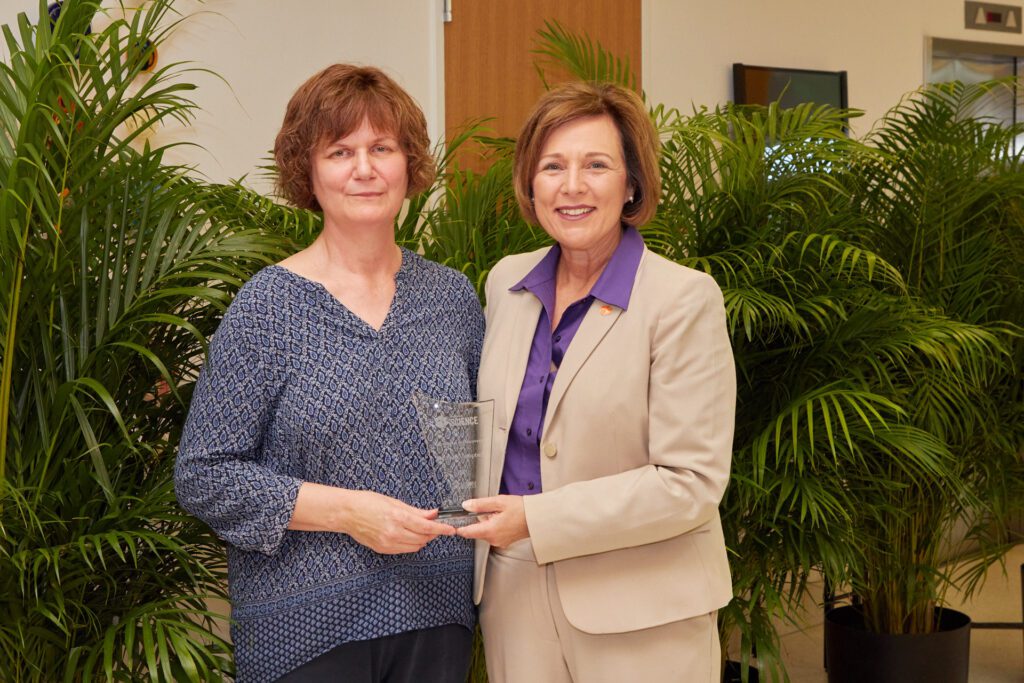
Excellence in Discovery Award: Barbara Campbell
Barbara Campbell has an internationally prominent research program that has received significant extramural funding. Her lab, which combines fieldwork with bioinformatics to understand how microbes influence aquatic, soil and host-associated ecosystems, is currently supported by six external grants, including a five-year, $25 million grant from the National Science Foundation.
She has published 52 manuscripts and one book chapter. These publications have averaged 330 citations per year from 2016-2022. Over the past three years, she’s published seven papers that have impact factors of greater than six. Fifteen of her papers — including nine on which Campbell is the first author — have more than 100 citations each.
She has secured $19.53 million in grants since she arrived at Clemson 11 years ago.
“Barb brings a keen mind and critical thinking to crucial problems in the evolution and ecology of bacteria and viruses. She has been working at the cutting edge in the application of various molecular or culture-independent approaches for examining microbes in the oceans and other natural environments,” wrote David Kirchman, Professor Emeritus at the University of Delaware. “Barb’s work promises to provide many insights into unresolved questions about marine bacteria and their role in the carbon cycle.”
The College of Science pursues excellence in scientific discovery, learning, and engagement that is both locally relevant and globally impactful. The life, physical, and mathematical sciences converge to tackle some of tomorrow’s scientific challenges, and our faculty are preparing the next generation of leading scientists. The College of Science offers high-impact transformational experiences such as research, internships, and study abroad to help prepare our graduates for top industries, graduate programs, and health professions. clemson.edu/science
Get in touch and we will connect you with the author or another expert.
Or email us at news@clemson.edu

